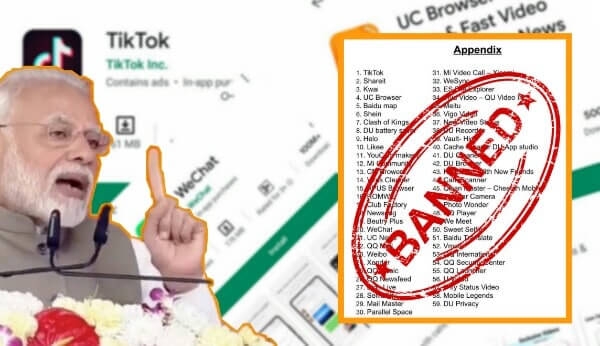If India's sovereignty can be damaged by a handful of apps, just how vulnerable is it?
Total Views |
(This article is one side of the debate published on NewsBharati. The Counter-part to this is provided for your ref in the end)
In an apparent move to boycott Chinese products and services, the Indian government on Monday imposed a ban on 59 Chinese mobile applications including TikTok, WeChat, UC Browser and CamScanner. While offering a lackluster explanation for this so called 'sensible' move, the Indian government has actually made its political crackdown on Chinese companies open and blatant. According to India's Ministry of Electronics and Information Technology, the Chinese apps have been blocked from the local market for engaging in activities which are prejudicial to sovereignty and integrity of India.
If India's sovereignty can be damaged by a handful of apps, just how vulnerable is it? It is undeniable that the app ban will hurt the commercial interests of relevant Chinese companies, but, when looking at the bigger picture, it is clear that India is in no position to cause harm to China's juggernaut economy. After the border brawl, China has been calling for calmness and earnest efforts from the Indian government to protect bilateral economic and trade ties, because the ties benefit both parties. But now it seems that not only has the Modi government failed to rein in the rising nationalism among Indians, it has also yielded to domestic pressure and even encouraged such a boycott to escalate.

India's attempt to extend the China boycott to the internet services sector is sending a very negative signal as the country's boycott-China provocations will further worsen bilateral relations to trigger an economic conflict. Over the years, China-India border brawls have occasionally occurred, but it would be uncommon for the two countries to engage in an economic war. Even during the Doklam standoff in 2017, India's economic losses were limited as bilateral trade ties recovered quickly following the crisis. But does that mean the Indian side should underestimate the consequences of an economic war with China?
India as a sovereign state has the right to ensure its citizens' data privacy, but there are many other ways of doing that. Take TikTok as an example. If India had any legitimate concerns about the company's data handling it could have asked TikTok and others to shift their data servers into India, bringing them under the regulations of Indian authorities. It is also surprising how the likes of Sweet Selfie and Youcam Makeup can be categorized as threats to national security when all they do is to make people's selfies look better. Unfortunately, instead of making real efforts to ensure user data privacy, the ban seems more politically motivated.
There have been growing calls in India to boycott 'Made in China' products, but that is not possible, at least under the present circumstances. Since the Indian government had to be seen doing something, the easy way out was banning these mobile apps. In the age of digital technologies, coupled with worldwide lockdowns, mobile apps have become more of a user commodity rather than a luxury. Banning global apps like TikTok and SHAREit will not only affect these companies but also the thousands of Indian IT workers working for these companies.
It is also a step toward slowing down globalization, which has proven extremely beneficial for both Asian nations. It is definitely not a step in the right direction and does not help with the agreement reached between the two countries to deescalate tensions and strive for the normalization of relations. The impact of the recent border clash is not something the two countries have seen before. Under such circumstances, if the Indian government continues to pamper the country's nationalist sentiment, it may suffer more economic losses than it did during the Doklam crisis. Now it remains sincerely to hope the Indian government will wake up to the reality of the situation and help prevent the current crisis from deteriorating to a firestorm.
(With inputs from The Global Times- https://www.globaltimes.cn/content/1193071.shtml)
Counter Point-

